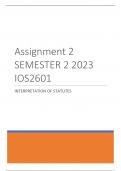Exam (elaborations)
2023 SEMESTER 2 ASSIGNMENT 1 ANSWERS - Interpretation Of Statutes (IOS2601)
- Course
- Institution
ASSIGNMENT 01 The Jaga v Dönges 1950 (4) SA 653 (A), which was delivered at the height of apartheid, remains important for the interpretation of statutes after the democratic transformation. Kindly read the case and answer the following questions. (a) BRIEFLY PROVIDE facts of the Jaga case. (6...
[Show more]



